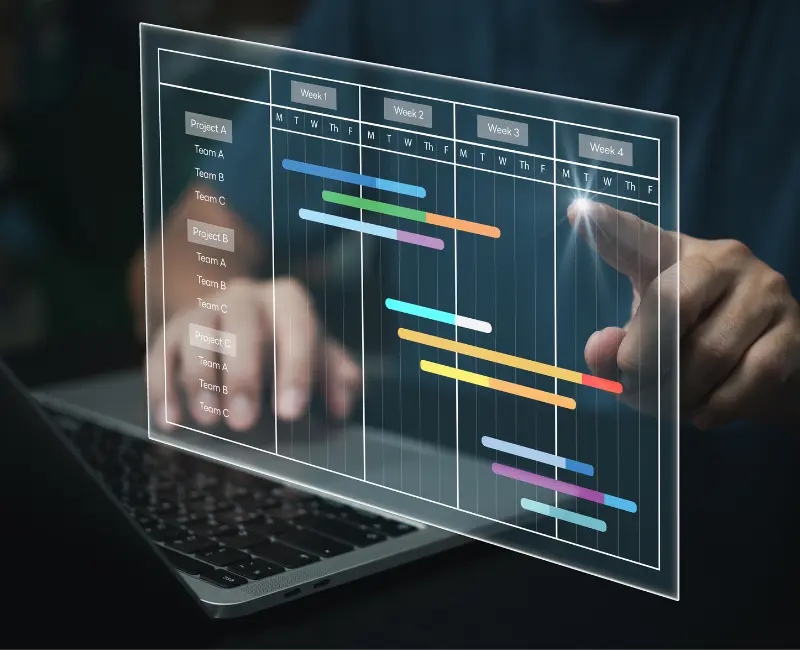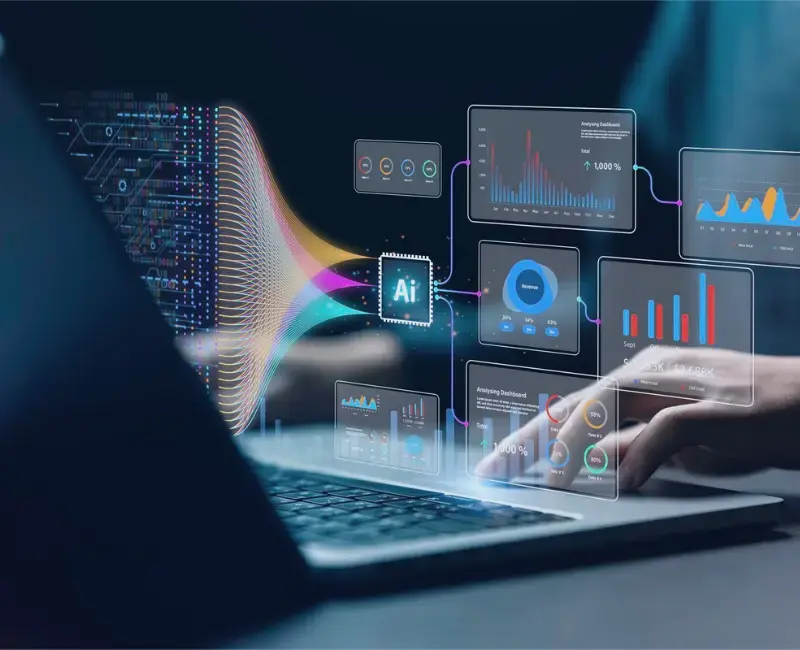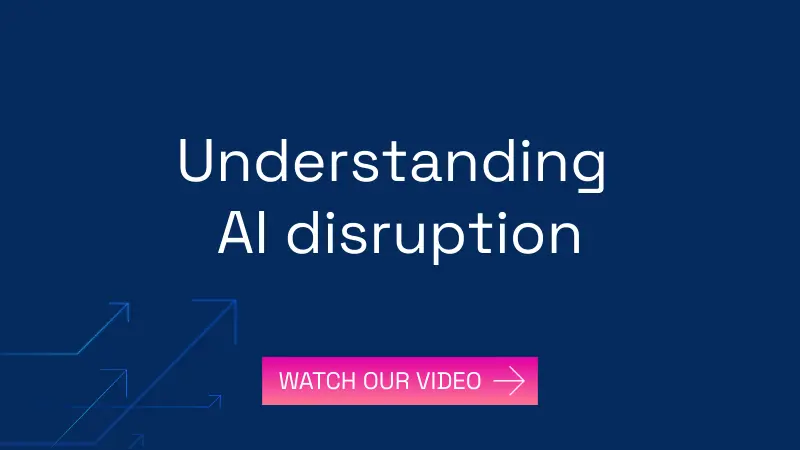AI disruption audit
Helping investors and businesses evaluate AI’s potential to reshape industries, impact existing players, and enable long term innovation-driven growth.
Evaluating AI-driven risks across your portfolio
The rapid evolution of AI presents both opportunities and risks for investors. Vaultinum’s AI disruption audit helps PE investors determine whether their portfolio companies face displacement from AI-driven competitors. By analysing AI’s impact on industry landscapes, market positioning, and business model sustainability, our audits provide strategic insights to help investors future-proof their investments.

They trust our expertise
Our AI Disruption clients
Turn AI risks into a long-term competitive advantage
How we assess AI’s disruptive potential
01
Industry and market analysis
02
Company-specific assessment
03
01
Industry and market analysis
- Analyses AI’s impact on the company’s sector
- Identifies emerging AI-driven competitors
- Determines whether AI acts as a disruptor or enabler
- Tracks AI adoption trends across the industry
02
Company-specific assessment
- Analyses how AI is integrated into the business strategy
- Evaluates the company’s readiness for AI-driven market shifts
- Identifies gaps in AI adoption and innovation
- Measures competitive positioning in an AI-driven future
03
Future investment strategy
- Identifies AI investment opportunities
- Highlights areas where AI can enhance efficiency and growth
- Assesses AI-related risks for long-term business sustainability
- Provides actionable recommendations for AI integration
Would you invest in tech blindly?
At Vaultinum we understand that investing in tech can seem risky. We run in depth due diligence to help investors dare with care, invest boldy while managing risk intelligently.
Who benefits from AI disruption audits?
Benefits for Private Equity investors
- Assess AI threats to portfolio companies and preempt disruption
- Pinpoint emerging AI competitors and market shifts
- Future-proof business models against AI disruption
- Gain concrete recommendations for AI-driven growth
Benefits for tech-driven businesses
- Benchmark AI adoption against competitors
- Detect vulnerabilities in current AI positioning
- Identify AI-driven revenue opportunities
- Align AI strategy with long-term business goals
Balancing risk, opportunity, and long-term value creation

FAQ AI Disruption Audit
What is an AI Disruption Audit?
An AI Disruption audit is a targeted due diligence analysis that evaluates the risks and opportunities a company faces from external AI technologies. It focuses on how advances in generative AI, machine learning, and automation could erode the value of existing software features, impact market positioning, or alter customer expectations. Rather than assessing internal AI readiness, this audit examines whether the business is vulnerable to being outpaced by AI-native competitors or commoditized by widely available AI tools. The audit combines technical and strategic analysis to surface threats to defensibility, product differentiation, and long-term scalability.
Why is an AI Disruption Audit important for businesses today?
An AI Disruption Audit is essential for understanding how emerging AI technologies could challenge a company’s market position, product relevance, or long-term defensibility. As generative AI and automation tools rapidly commoditise capabilities that were once differentiators, businesses face the risk of being outpaced by more agile or AI-native competitors. This audit helps identify where a company’s value proposition may be vulnerable, whether through feature displacement, margin pressure, or changes in customer expectations, and provides a framework for responding proactively. Rather than reacting to disruption after it’s already eroded market share, the audit enables leadership to prioritise investment, evolve the roadmap, and reinforce strategic moats before they weaken. It’s not just about managing risk, it’s about protecting value and staying ahead of the curve.
How do you perform an AI Disruption Audit?
An AI Disruption Audit begins with a deep understanding of the company’s core value proposition, product architecture, and competitive positioning. We assess where generative AI, machine learning APIs, or automation tools could replace, replicate, or undermine existing features — particularly those considered proprietary or strategically differentiating. This involves mapping product functionality against current and emerging AI capabilities in the market, analysing how customer expectations are evolving, and reviewing how exposed the company is to commoditisation risks. We also look at internal adaptability: how quickly the team could respond to AI-driven shifts in the competitive landscape. The outcome is a clear picture of the business’s resilience to external AI disruption, and a set of prioritised recommendations for strengthening defensibility and future-proofing the product strategy.
How can an AI Disruption Audit help in M&A or investment due diligence?
An AI Disruption Audit provides important context during M&A or investment due diligence by assessing whether the target’s technology and product offering are resilient in the face of rapid AI innovation. It helps buyers and investors understand if core features are at risk of being commoditised by widely available AI tools, or if the company’s differentiation is likely to erode in the near term. This insight informs valuation, post-deal investment planning, and go-forward product strategy. It also highlights whether the company is proactively adapting to AI-driven shifts in its market, or if it’s exposed to disruption without a clear roadmap for response. In increasingly AI-saturated sectors, this audit adds an essential lens to traditional tech and commercial diligence, helping deal teams assess not just where the company stands today, but how defensible its position will be tomorrow.
What are the deliverables of an AI Disruption Audit?
An AI Disruption Audit delivers a strategic, forward-looking assessment of how external AI advancements could impact your business model, product differentiation, and long-term defensibility. You can expect a thorough review of your core features and technical capabilities, mapped against current and emerging AI trends, to identify where risk or erosion of value might occur. We also assess how equipped your team and architecture are to respond to disruption. The final deliverable is a detailed AI Disruption Audit Report, which includes risk areas, competitive exposure analysis, and actionable recommendations to reinforce your product strategy and safeguard your market position. This report can be used internally for strategic planning, or externally as part of investor conversations or due diligence preparation.
Who should conduct an AI Disruption Audit?
An AI Disruption Audit is particularly relevant for tech-enabled businesses whose products rely on proprietary features, workflow automation, or data-driven differentiation such as SaaS platforms, marketplaces, and vertical software providers. It’s especially valuable for companies operating in sectors where AI innovation is moving quickly and lowering the barrier to entry for new competitors. The best time to conduct the audit is ahead of a fundraising round, strategic sale, or major product pivot, when understanding potential threats to long-term defensibility is critical. It’s also useful for mature scale-ups and private equity portfolio companies looking to protect or enhance value in the face of rapidly evolving AI capabilities. In short, any company whose business model depends on maintaining a technology edge should consider this audit as part of strategic risk planning.
How is an AI Disruption Audit different from a competitive analysis?
While a traditional competitive analysis focuses on market positioning, pricing, features, and go-to-market strategies, an AI Disruption Audit zeroes in on how advancements in AI could erode a company’s product differentiation at the technical level. It doesn’t just ask who your competitors are, but how your features or workflows could be replicated or outpaced by accessible AI tools, APIs, or generative models. The audit examines the structural risk of commoditisation from AI-native players or open-source innovation, which may not be apparent in a standard market comparison. It’s a forward-looking, tech-driven assessment designed to flag threats before they impact revenue or valuation and to guide more resilient product and technical strategy.
What kinds of AI technologies are most relevant to disruption today?
The AI technologies most relevant to disruption include generative AI models (e.g. large language models like GPT or Claude), foundation model APIs (such as those from OpenAI, Anthropic, Google, or Mistral), and automated ML platforms that allow non-experts to deploy predictive systems with minimal code. These tools can quickly replicate functionality once considered proprietary such as content creation, data extraction, summarisation, classification, or customer support at a fraction of the development effort. Open-source AI ecosystems are also advancing rapidly, reducing the cost and time required to build competitive features. The AI Disruption Audit helps map these trends against your product, showing where you may be most exposed and what that means for future defensibility.
Do we need to be using AI internally to benefit from an AI Disruption Audit?
Not at all. The AI Disruption Audit is designed to assess external threats, meaning it’s just as relevant for companies not actively using AI as it is for those already investing in it. The core focus is on how advancements in AI could replicate or commoditise your product’s key features, regardless of whether you’ve built AI into your own stack. In fact, companies that haven’t yet explored AI may be more vulnerable to disruption, since competitors or open-source tools may already be providing similar functionality with lower effort and cost. The audit helps you understand where your business is exposed and what strategic steps you can take to stay ahead, even if AI adoption isn’t yet on your roadmap.
Our latest articles on



